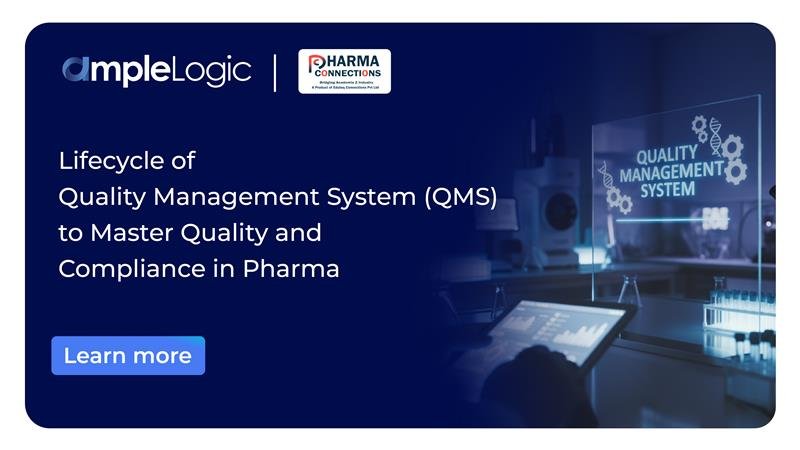
Strong quality management supports every stage of making medicine. You need safe, useful, and consistent products from start to finish. Companies use a Quality Management System (QMS) for this reason. A QMS joins together people, tasks, and technology so that rules and safety match targets. Every pharma business follows changing rules from the FDA and EU, so knowing QMS is about trust as well as following laws.
If you want a career in pharma, whether you’re new, working in quality, validation, or checking rules, QMS helps you grow.
This guide explains what QMS is, how it works, and which training and skills are important in real jobs.
About the Quality Management System (QMS)
The Quality Management System is a plan that contains written rules and routines, ensuring that the quality of products remains constant and corresponds with the laws and customer demands. It covers risks, record-keeping, audits, corrective actions (CAPA), and staff education. In drug companies, QMS connects every action from discovering new drugs to checking them after they reach the market, so medicines are made safely, work well, and use careful methods.
Core Components of a QMS
- Quality Manual — It is the main guide that describes a company’s aims and rules for quality.
- Standard Operating Procedures (SOPs) — These instructions tell workers exactly how to do tasks step by step.
- Quality Risk Management (QRM) — This process finds possible risks and controls them through every stage of the product’s life.
- Change Control System — It watches over any changes that could impact quality or legal approval.
- Documentation and Record Control — This keeps data correct and easy to trace whenever needed.
- CAPA System — It finds problems, fixes them, and stops them from happening again.
Together, these parts help a pharma company protect and improve quality all the time.
Standards to Follow for Quality Management System (QMS) in Pharma
A QMS is the foundation for a pharma company to ensure product safety, comply with laws, and protect patients. It depends on clear methods, reliable paperwork, and checking routines based on world standards. Using proper rules helps companies reduce mistakes and pass tests from international agencies.
1. ICH Q10 – The Pharmaceutical Quality System (PQS)
The ICH Q10 rule isn’t just one law; it’s a whole system for running a solid Quality System for drugs. It focuses on:
- Measuring process performance and the quality of finished products.
- Taking action when things go wrong (CAPA).
- Handling changes through a controlled method.
- Having management review processes and results regularly.
These are the points that ensure quality remains stable from pre-testing levels to after-sales applications.
2. ISO 9001:2015 – The Global Quality Management Framework
ISO 9001 finds application everywhere, including non-pharma in quality management. It helps improve systems, focus on customers, and keep on getting better. Main parts include:
- Writing down everything done for quality.
- Making leaders join in planning and checking quality.
- Deciding with risks in mind to avoid problems before they start.
Pharma companies tend to use ISO 9001 as a starting point to create more specific systems within the industry.
3. Good Manufacturing Practice (GMP) Guidelines
GMP is provided by official organizations, such as the FDA, EMA, and WHO. This code of conduct ensures that the drugs are produced properly and undergo quality checks. It involves:
- Keeping places clean and controlled.
- Training staff properly for their roles.
- Making records and keeping papers safe.
- Checking machines and processes are working correctly.
4. ICH Q9
The ICH Q9 guidelines put together a structured risk management approach in pharmaceutical quality systems. This allows Pharma companies to identify, assess, and manage potential gaps to product quality and patient safety.
Some of the key principles includes:
- Applying science-based risk assessment
- Implementing proportional controls based on risk severity
- Ensuring ongoing risk review through product lifecycle management
5. ICH GCP
ICH GCP employs the ethical and scientific integrity of clinical trials. Though, it may not be limited to manufacturing, it is ideal for pharmaceutical quality systems since it governs data integrity, patient rights, and reliability of trial results. These elements are critical for regulatory submissions and market authorization.
6. 21 CFR Part 210 & 211 – FDA Regulations
Rules in the United States say how drugs must be made and checked. They make sure that companies stay open and responsible at every level.
7. WHO QMS Guidelines
The World Health Organization offers useful standards for both developed and developing markets. These standards aim to make quality reliable worldwide, no matter where the drug is made.
8. EU GMP Annex 11 & 15
Companies in the EU follow Annex 11 for computer system checks and Annex 15 for validation routines. Both help keep products safe and ensure electronic or manual systems comply with regulations.
Importance of QMS in the Pharmaceutical Industry
A working QMS doesn’t just help companies obey the law. It sets up better habits, improvement, and ownership of results.
1. Ensuring Regulatory Compliance
Strong QMS processes are requested by such groups as the FDA, EMA, and WHO on the basis of good practices. By having a stable QMS, firms can fulfill these standards and avoid being troubled or fined.
2. Enhancing Operational Efficiency
QMS assists in arranging documents and records, streamlining processes, and reducing the number of mistakes made.
3. Building Market Credibility
With a trusted QMS in place, companies earn respect from both officials and buyers. This helps promote the image of the business as reliable and secure.
4. Mitigating Risks
QMS helps identify problems during the early stages with the assistance of risk checks and CAPA. That saves time and protects everyone from recalls or failed audits.
Core Processes in a Pharmaceutical QMS
Each main process in a QMS keeps up the level of quality. Key systems include:
1. Document Control
QMS makes sure all important files, records, and rules stay current, OK’d, and ready. Tracing paperwork is crucial in audits.
2. Deviation and CAPA Management
If something goes off track, QMS records it, reviews it, and corrects the process. By using CAPA, root causes get fixed, so errors stay gone.
3. Internal Audits and Self-Inspections
Auditing helps check if rules and methods are strong. Regular checks uncover issues and help staff get set for outside inspections.
4. Supplier Quality Management
Quality in ingredients or materials matters. QMS includes qualifying suppliers, running supplier checks, and reviewing performance.
5. Change Management
Each switch in routines, gear, or suppliers is reviewed for risk before going forward. This keeps drugs safe and meets the law.
Benefits of Mastering QMS for Pharma Professionals
QMS skills serve more than just quality teams. They can help any pharma worker grow faster.
1. Broader Career Scope
Staff with QMS training can join quality teams, rule-monitoring offices, or test equipment in labs.
2. Better Understanding of Compliance
Knowing QMS means being able to explain and follow legal directions, a key skill for higher jobs.
3. Enhanced Problem-Solving
CAPA, root cause analysis, and risk checks build up logical thinking. These are the tools that allow individuals to identify and correct issues fast.
4. Leadership Opportunities
Good QMS competencies provide the experience required to handle audits, control teamwork, and ensure compliance for every person within regulations.
Common Challenges in Implementing QMS
Strong systems still face obstacles. Main challenges involve:
- Resistance to Change — Staff may feel unsure or avoid new steps or technology.
- Complex Documentation Requirements — Keeping up with paperwork can take lots of time.
- Inconsistent Training — Gaps or delays cause mistakes in work routines.
- Global Regulatory Variations — International companies juggle several types of rules for each country.
Getting past these issues needs friendly leaders, ongoing training, and frequent checks.
Career Opportunities with QMS Expertise
People who know QMS well can pick from many jobs in pharma and biotech companies. Top jobs include:
- Quality Assurance Officer
- Regulatory Affairs Specialist
- Compliance Analyst
- Validation Engineer
- Quality Systems Manager
- Audit and Inspection Coordinator
- QMS Implementation Consultant
Why QMS Courses Are Essential for Career Growth
The easiest way to gain in-depth QMS knowledge is to join organized learning programs. A well-designed course provides hands-on practice with rules, paperwork, and real-world applications.
1. Comprehensive Understanding of Global Quality Standards
Courses by leading training providers like Pharma Connections teach key laws like ICH Q10, ISO 9001, and the FDA’s requirements. They are well-versed in the fact that these rules help companies meet global needs and are assets to big firms.
2. Strengthens Compliance and Risk Management Skills
Quality matters in every drug’s life. By using case studies and training on paperwork and error handling, learners develop strong skills in managing risks and maintaining data security.
- Spot issues early
- Learn to use CAPA the right way
- Build strength in doing audits and replying to questions from officials
3. Enhances Operational Efficiency
QMS lessons teach Lean and Six Sigma for simpler, faster work. With digital tools growing, certified pros can connect new systems, use dashboards, and cut mistakes.
4. Expands Career Opportunities Across Departments
Knowing QMS opens roles in different teams:
- Quality Assurance (QA) — handling rules and records
- Quality Control (QC) — running or checking lab tests
- Regulatory Affairs — sending required reports to global agencies
- Production & Operations — using QMS for better, smoother processes
5. Builds Leadership and Strategic Thinking
A QMS course isn’t just theory — it teaches how actions affect patients and company reputation. Certification helps people run teams, make policies, and aid company growth.
6. Future-Proofing Careers in an AI-Driven Quality Landscape
More companies use AI for checks and audits. QMS courses by Pharma Connections now teach about digital platforms, smart analytics, and automatic record checks. This tech makes staff ready for the future.
Conclusion
A Quality Management System is more than just a rule; it is the foundation for safety, trust, and top results in pharmaceuticals. As companies move toward more technology, data tracking, and continuous improvement, anyone who understands QMS will have an edge.
By enrolling in the Quality Management System by Pharma Connections, you learn more than rules. You gain skills for leading quality programs, passing checks, and advancing in your career. For anyone looking to thrive in the new world of pharma managing QMS, Pharma Connections provides learning, expert support, and real solutions to help you go far.





















